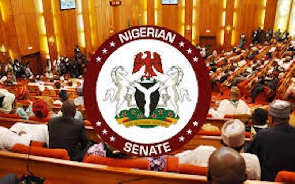Two of President Bola Tinubu's four proposed tax reform legislations were approved by the Senate on Wednesday.
The bills includes: The Nigerian Tax Administration Bill and the Nigerian Revenue Service Establishment Bill.
After the senators examined the findings of an ad hoc committee led by Senator Sani Musa of Niger East, the legislation was approved.
The committee was established to resolve disagreements and controversies pertaining to the proposed reforms. The Committee of the Whole discussed and deliberated on the legislation's contents on Wednesday.
Following a majority of senators' voice votes in favor of the bills, Senate President Godswill Akpabio declared their passage.
According to Akpabio, a committee will be established by the Senate to align its ruling on the legislation with the one that was approved by the House of Representatives in March. The combined bills will be delivered to President Tinubu for his approval after they have been harmonized.
The President of the Senate stated that the Nigerian Tax Bill and the Joint Revenue Board Establishment Bill would be passed on Thursday.
A revised allocation
According to the Nigerian Tax Administration Bill, the federal government would receive 15% of VAT revenue, states and the Federal Capital Territory (FCT) would receive 50%, and local governments would receive 35%.
A revised allocation of 10% to the federal government, 55% to the states and the FCT, and 35% to local governments was suggested by the committee.
The committee suggested that 70% of the VAT intended for local governments be distributed evenly among them, with the other 30% being distributed according to each local government's population.
The committee also changed Clause 107 of the Nigerian Tax Administration Bill, which stated that anyone found guilty of not paying taxes that were withheld at the source or from their own account would face a maximum sentence of three years in prison.
The committee also suggested that the Federal Inland Revenue Service (FIRS) be replaced as the agency in charge of collecting federal taxes by the Nigerian Revenue Service (NRS).
Regarding the agency's suggested structure, the committee suggested designating a board chairperson who would be chosen by the President of Nigeria. Additionally, if confirmed by the Senate, an executive vice chairperson will lead the organization.
A secretary, who must have at least the position of Deputy Director and be a lawyer, chartered accountant, or chartered secretary, is also required.
Six executive directors will also be appointed, one for each geopolitical zone, and they will be chosen alphabetically and rotated. It is required that the executive director, vice chairperson, and executive chairperson all come from different states.
The service will also need to submit its annual report within three months of the conclusion of the previous year.
FG releases list of property exempted from tax
Legit.ng reported that as part of the latest reforms contained in the Tax Reform Bills currently before the National Assembly, major changes have been made to the taxation of properties.
The first major change is that properties with rent above N10 million will be required to pay stamp duties, while properties with rents below N10 million will be exempted from stamp duties.
The Chairman of the Presidential Committee on Fiscal Policy and Tax Reforms, Taiwo Oyedele, disclosed that this is contained in the new tax bill.
Business News of Thursday, 8 May 2025
Source: www.legit.ng













